Über Wikipedia, die dunklen Seiten der Menschheit und die Mixtapes ihres Vaters: Sängerin Susanne Sundfør im Klangverführer-Interview
Der vergangene Sonnabend war bis jetzt *der* Konzerttag des Jahres:
Da rockten mal wieder die Cosmonautix das Haus 13 im Pfefferberg,
Ben L’Oncle Soul gab sich im Postbahnhof die Ehre und die norwegische Sängerin Susanne Sundfør spielte in einem meiner Lieblingsclubs – dem Frannz. Und was habe ich an diesem wunderschönen 7. Mai gemacht? Renitente Hundetiere gehütet. Nein, Kopfhörerhund ist selbstverständlich kein renitentes Hundetier. Was unseren Gast, einen doppelten Jagdhund – doppelt in dem Sinne, dass er ein Mix aus Weimaraner und Deutsch Kurzhaar ist – angeht, hüllen wir uns in vornehmes Schweigen. Trotzdem mag ich den Stinker irgendwie. Und Susanne Sundførs Musik konnte ich bereits bei einem kleinen, aber sehr feinen Akustik-Showcase im letzten Monat kennenlernen. An jenem Sonntag stand mir die junge Künstlerin außerdem Rede und Antwort im Klangverführer-Interview.
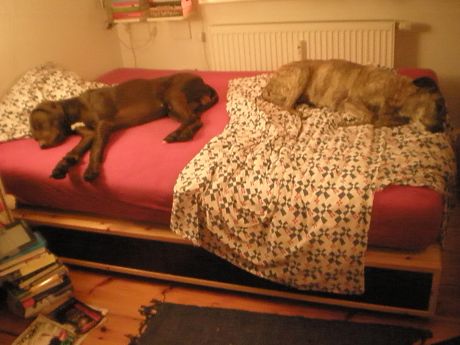
Das Getier hat sich schon mal hingelegt …
Als sie mir so gegenübersitzt, merke ich: Sie ist wirklich noch sehr jung. Es gibt ja Medienprofis, die lassen gar keine Gesprächspause aufkommen. Die wissen, wie sie von einer Frage geschickt auf jene Themen überleiten, die ihnen wichtig sind. Susanne Aartun Sundfør beantwortet nach intensivem Nachdenken mit leiser Stimme genau die Fragen, die man ihr gestellt hat. Nicht weniger, aber auch keine Silbe mehr. Fast kleinmädchenhaft schüchtern wirkt sie; zur moralischen Unterstützung hat sie sich einen (ihren?) Freund mitgebracht. Nein, ins Plaudern gerät man mit Susanne Sundfør ganz bestimmt nicht. Im Gegenteil: Noch nie war ich so schnell mit einem Interview fertig. Und habe trotzdem alles erfahren, was ich wollte. Und das eine oder andere überraschende Detail, wie beispielsweise Sundførs Vorliebe für Dubstep, konnte ich ihr dann doch noch entlocken. Nicht zuletzt weiß ich jetzt endlich, wie man den norwegischen NuJazzer Bugge Wesseltoft ausspricht …
The singer who is not the “Norwegian Björk” on her yen for vintage music, the ugliest parts of humanity and Wikipedia
Klangverführer: The Brothel is your first album which will be released outside of Scandinavia. How do you feel about this?
Susanne Sundfør: Very excited. In May we’re going on tour with Thomas Dybdahl, we’re supporting him in Germany and France, so that’ll be my first tour outside Norway – so everything is very… like, open … and exciting!
So what kind of expectations do you have?
I don’t know! I try to be just very open about it and not really expect that much! But of course I hope that I get to play a lot in Germany and in the rest of Europe.
Germany is planned from the 6th to the 11th of May. Which other countries will you play in?
Well, I think Grönland [editor’s note: Sundfør’s record label] has a … I think they have a licence deal with France, Spain and Portugal, and then look. So I think the album will be released in all these countries at once … or at the same time as in Germany …
20th of May, I think …
I actually don’t know! I’m supposed to know this …
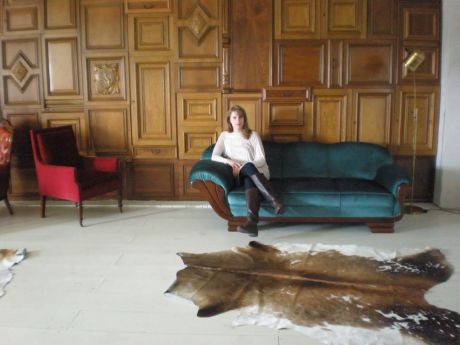
Der Whiskey Room im Hotel Michelberger. Coole Location …
Well, music from Norway, especially Jazz, has reached enormous popularity and became a major force in the so-called Nu Jazz. Especially the combination of sweet melodies with electronic sounds seems to be characteristic for modern Jazz sounds coming from Norway – just thinking of artists like Bugge Wesseltoft. Do you regard yourself as a part of the contemporary Norwegian Jazz scene?
No, not really. I don’t really do Jazz music. I consider myself as a pop musician, but on this album I worked with a Jazz musician, with Lars Horntveth. He is known for his work for Jaga Jazzist. So I guess a lot of Jazz elements on the album are from him. But I don’t really consider myself part of that movement.
Even though you are not part of this fast-selling label – your album seems to have the same success like Norwegian NuJazz. Do you have any explanation for this?
In Norway? It’s really gone very well in Norway. I don’t really know why. To me it’s very surprising because I thought when we recorded the album I wouldn’t get that much airplay … that they wouldn’t play the music on the radio and that it would be an album that people wouldn’t really notice. But for some reason they did – which is extremely flattering nice, but I don’t really know why. It’s very nice.
One of your compatriot musicians used to say that there must be something in the water …
Oh, okay, I’m gonna say that next time!
Well, alright. When I listen to your album I sense you display a great variety of styles, there is Jazz, there are a capella choirs, there are Electronica, pop beats and even chamber music arrangements. How would you describe the style of your music?
I would say it’s Pop and Electronica, in a way. But on this album, there are very many different elements. But generally – like, with the melodies and the way I sing the melodies and how many of the songs are arranged – like, the core of the album is very pop-ish, if you ask me. Even though there are other elements I would definitely say that it is a pop album with … like, a more edgy pop album. I would say that, yeah.
To me, your album seems to go deeper than a conventional pop record …
Yeah, well, I guess, maybe not lyrically it’s typically pop. You know, the themes aren’t really common in pop music. But I think melodically it’s definitely a pop album.
I understand. You know, critics like to classify everything; they like to pigeonhole music and artists into categories. Unsurprisingly, some of them tend to call you the “Norwegian Björk”.
Oh, really?
Yeah, really. Your German promoter said he’s gonna beat me up if I wrote anything like this …
Oh, cool …
… so I will definitely not refer to you as the „Norwegian Björk“. However, on the English-speaking Wikipedia I have read that you count Beyoncé as one of your biggest influences. In what way did the American R&B singer influence your music?
Well I think maybe that was … like, an interview a long time ago: They asked me what kind of music I like and I said a lot of different music and then I said Beyoncé, because I do think she’s really cool and I really like her music, but I wouldn’t say that my music is … like, very inspired by her music. But I think she’s really cool. But that Wikipedia page is not very accurate in many ways, but I mean I can’t do anything about that but go onto the page and write stuff … but I don’t really agree with much on that page.
So, what would you say: What are your main influences? Are there any artists that have influenced your music at all?
Yeah, absolutely! I guess Radiohead has been very important, and just before I started recording the album I listened a lot to Burial which I really like, and on my fist album – the album before The Brothel – I listened a lot to Carly Simon. Her way of writing melodies and harmonies has really inspired me. So I guess Carly Simon and Radiohead would perhaps be the most important influences on this album.
Well, like you’ve just mentioned, the lyrics on The Brothel are not very common for a pop album. Your lyrics often seem to deal with the dark side of humanity: There is the story about the brothel, of course, but we also have the biblical myth of Lilith, you sing about the black widow spider, about a dark knight and so on. What fascinates you about this topic?
Well, I guess when I started writing the lyrics and tried to figure out what would be the themes and where the focus would be, I found that it was really fascinating to try and write about what is considered to be like ugly or taboo in society and try to make it beautiful, in a way. So I tried to use images that deal with no so pretty things and try to make them pretty anyway. I guess that’s what fascinates me about “dark” things or, you know, the brothel and everything: that it’s a place that is considered as very wrong, everything is wrong and – how do I say it? – like … yeah, “taboo”, I guess. And then try to write about it in a beautiful way. I guess that’s what I tried to do!
Just to gain more social acceptance for these “wrong” places?
No, no – not in that way! It’s not a political album at all. More like trying to find the ugliest parts of humanity and then try to describe them in a beautiful way. Because I like the battle between in a way, those two worlds, if you know what I mean … It’s a bit difficult to explain.
Well, I guess I know what you mean. On your official website I have read that this record marked a turning point in your career and that you have already now decided to dedicate yourself fully to music. You had not been sure until then if you didn’t want to have a “normal” job rather. Which would you have done if you hadn’t become a fulltime musician?
I think I would have probably become a teacher and I would have probably studied a language because I think that’s very interesting. Or maybe I would have become … somebody who gives singing lessons, something like that. I don’t really know. I don’t … It’s a bit scary to think about it because you never know if the next album will be popular or not and then suddenly you’re standing there with no money and then you have to find yourself a work! So, I try not to think too much about that and just focus on being positive and just hope that what I do right now is something I can do for a long time!
You said you have thought about being a teacher – is teaching an aspect of your artistic work?
No. No, not really. But I guess if I couldn’t be a musician that would probably be the profession I would go into.
I see. Two last questions. What can we expect from tonight’s’ show case?
Well, usually I play with my band, and tonight it’s just gonna be me and the piano, or: I’m gonna play the piano. And I think I’m gonna play about 30 minutes, so I will probably play … Well, I haven’t made the set list yet, but I think I’m gonna play a lot from The Brothel and maybe some new stuff.
Will there be any electronic devices, too, or are you trying to substitute the whole band by the piano?
Well, the thing is, when I write the music or when I make the songs, I usually start with just the piano and singing. So I guess I won’t try to put all the elements into the piano. It’ll be just more like a simple presentation of the album.
So we can more or less expect the songs in their demo version?
Yeah, pretty much.
Great! Well, is there anything left you would like to let the German audience know? About you, about your music, about your new album, whatever?
Oh, it is so difficult to answer that question! I don’t know.
Well, maybe “Wikipedia” is the catchword here: You said you don’t really agree with some information on the page. What would you like to correct?
Well, it says that I have a background in Jazz and classical music, which isn’t really … it’s not accurate at all. I used to take singing lessons in opera, so I guess the classical part is correct but I never really had a Jazz background.
So when did you start with your voice lessons?
When I was twelve; and I quit when I finished high school and moved away from my home town. So I guess that’s really been an important part of shaping the way I sing and everything. And also I took piano lessons in classical piano. I guess I started just practising in classical music and then I started writing my own music and tried to combine … like, pop and classics, perhaps.
Influenced also by your father’s cassette tapes, perhaps?
Yeah, when I was a little girl he used to make me mixtapes with artists like Cat Stevens and John Lennon, the Beatles and a-ha … I don’t remember any more, right now, but there were a lot of singer/songwriters, so when I started making music I wanted to write it in that style, so my first album is very influenced by those artists. And then, after that, I started to listen to more contemporary music, and that music inspired me to this record.
What kind of music are you listening to in private at the moment?
I listen a lot to Dub Step. Yesterday I tried to find out where dubstep comes from and had this little tutorial with myself. I found the dub genre, so I think that’s a genre I still wanna check out! And also I listen to … I always like to listen to Knut Nystedt. He is a contemporary composer from Norway. I think maybe he’s dead now [editor’s note: Born 1915, Mr Nystedt still enjoys good health], but he wrote some fantastic choral music. Yeah, that’s what I listen to right now.
Isn’t dubstep rooted somewhere in Reggae or Ragga?
Yeah, because dub comes from Reggae. And also Drum and Bass.
Oh, I like Drum&Bass very much!
Yeah, really?
Yeah, I listen to it a lot. Well, slowly we’re running out of time and I still would like to take some pictures of you fpr my blog, if you don’t mind. So thank you very much for the interview!
Thank you!
Die Stücke Sundførs, die auf der Platte noch am ehesten wie eine Mischung aus Soap & Skin und Agnes Obel klingen, erinnern in der Akustikversion fast schon an John Dowlands elisabethanische Strophenlieder. Und spätestens bei Turkish Delight verliert sich alles jungmädchenhaft Zarte in der Stimme der 25-Jährigen. Die letzten beiden Songs ihres traumschönen Akustik-Sets in der Lounge des Michelberger Hotels können Sie hier sehen: Einmal einen neuen Song und einmal das meiner Meinung nach schönste Lied aus The Brothel – den titelgebenden Song.
The Brothel erscheint in Deutschland am 20. Mai bei Grönland/rough trade. Außerdem wird es die „Platte des Monats“ der nächsten Victoriah’s Music auf fairaudio.de

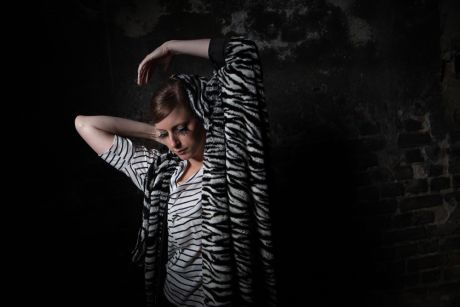
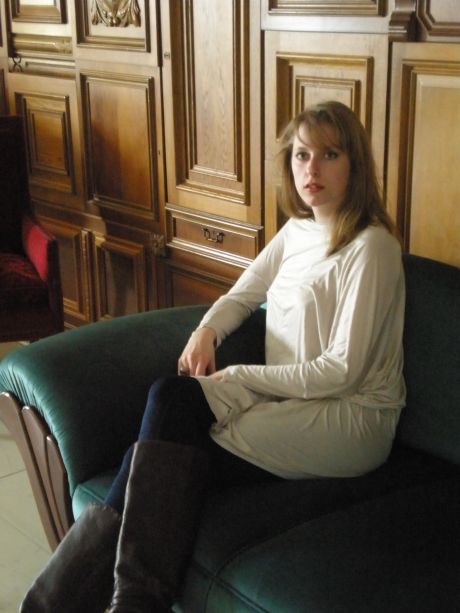
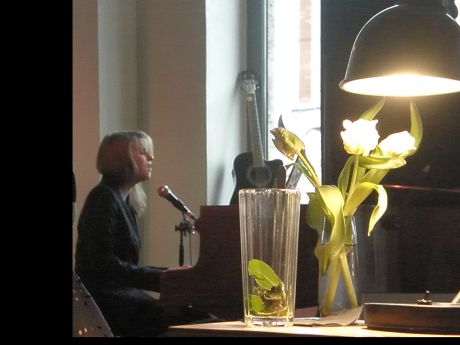
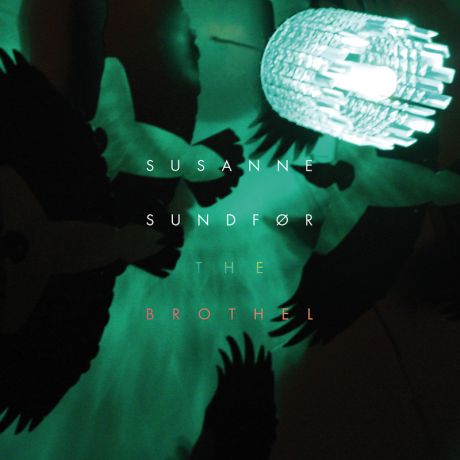
Comment (1):
Nicht Standbar-Soundtrack, sondern Kunstwerk: Susanne Sundfør bei Victoriah’s Music «
[…] Sundfør im Klangverführer-Interview gibt es hier. Kommentare […]